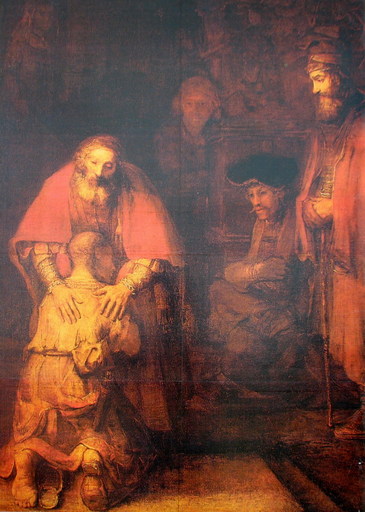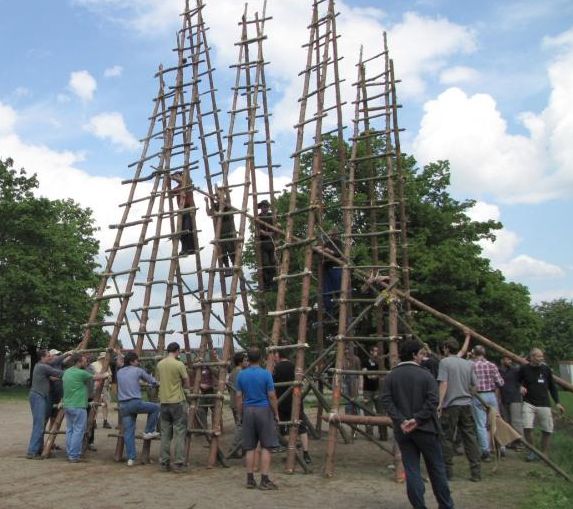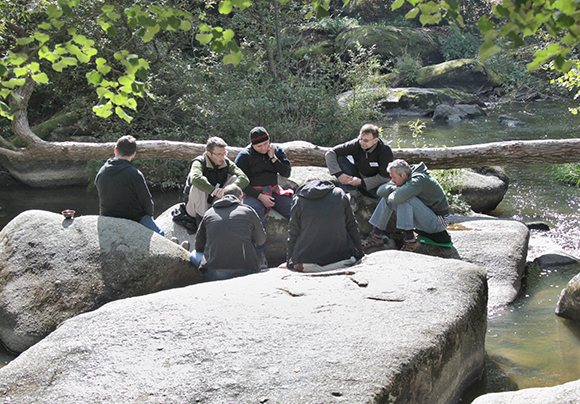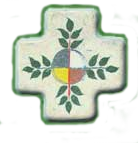
Starý muž, který se neumí smát, je trouba.
Richard Rohr
Kdo jsme?
Tento web reprezentuje hnutí Chlapi, neformální společenství mužů, kteří hledají takové způsoby duchovního prožívání, se kterými se dokážou jako muži ztotožnit a celou bytostí je žít.
Můžeš se tady setkat s muži, kteří usilují o to být lepšími a více autentickými.
Vytváříme jak reálný tak virtuální prostor pro setkávání.
Začalo to někdy před rokem 2000 hledáním mužské energie, spirituality i chlapské party a setkáváním v malých skupinách. Pokračovalo to inspirací dílem Richarda Rohra a jeho Rituálem pro přechod do zralé dospělosti a pokračuje to dodnes stovkami setkání v malých skupinách, víkendovými akcemi pro muže i pro otce a děti, rituály i celostátními setkáními pro stovky účastníků a mezinárodní spoluprací s hnutím mužů po celém světě.
Pro řadu z nás je podstatné přátelství s Bohem, pro všechny jsou oporou kamarádi, které tu nalezli.
Vítáme tě mezi námi a těšíme se na společné putování.

Pavel Hrdina a Martin Šmídek
Překlad meditace CAC ze čtvrtka 10. 10. 2024
na téma:
Tanec s božským ohněm
| Následování Božího vedení V podzimním čísle časopisu ONEING se Dr. Jacqui Lewisová zamýšlí nad bohatou historickou tradicí tance v afroamerické kultuře: Zotročení Afričané tančili džubu nebo hambon, protože na plantážích nesměli hrát na bubny, a používali své ruce a těla k vytváření zvuku, aby se uzemnili ve své radosti, která představovala odpor. Naši lidé stepovali, spojovali irský tanec, britský clogging a západoafrický tanec, vytvářeli ve svých podmínkách něco nového ze starého a nového materiálu, něco jako quilting. Po sběru bavlny jsme tančili kruhový pokřik, dokud nás nezasáhl Duch a nepřipomněl nám, že umíme vzlétnout do nebe. Černoši přinesli náš tanec z Nigérie, Ghany a Trinidadu a proměnili ho v charleston.... Žádná tragédie, žádný smutek, žádná ztráta nemohla tanec zastavit. Tanec byl místem setkání s Bohem, místem nácviku svobody, za kterou jsme se modlili. Tanec s Bohem jako partnerem byl aktem prorockého odporu, vzdorem proti otroctví, nástrojem osvobození. Lewisová popisuje, jak Bůh podporoval její společenství Middle Collegiate Church poté, co požár zničil jejich svatyni: Byli jsme ubití COVIDEM, zármutkem a nesnesitelnou bolestí z rasového teroru v našem národě, ale věděli jsme, že Bůh je schopen udělat víc, než jsme mohli žádat nebo si představit. Zvládli jsme to, protože jsme upírali oči na našeho partnera. Měli jsme uši naladěné na volání v našich životech a věděli jsme - v našem utrpení - že ho nezpůsobil náš Bůh. Věděli jsme, že můžeme každý rok tančit na místě požáru a složit svá břemena, protože žádný Bůh nechce utrpení, které požár způsobil, protože žádný Bůh, který nás miluje, by náš zármutek navrhl. Věděli jsme, že náš partner umí tančit, že nás dokáže provést těžkým terénem. Stačilo se jen opřít o věčnou náruč.... Věděli jsme, že záměrem našeho tanečního partnera je, aby svět vzkvétal. Věděli jsme, že oheň nezpůsobil Bůh, stejně jako oheň rasové nespravedlnosti, oheň ekonomických rozdílů a oheň, v němž jsou pohlaví, sexualita, náboženství a věk důvodem útlaku a násilí.... Lewis zdůrazňuje naše partnerství s Bohem v tanci vytváření nového světa: Potřebujeme choreografovat nové teologické chápání Boha. Co když Bůh přece jen neorganizuje vesmír naším jménem? Co když Bůh místo toho pozoruje, naslouchá a čeká - čeká na naše volby, naše rozhodnutí, naše působení, aby ze světa a našich životů udělal to, co chceme? Co když Bůh se vším nemanipuluje, ale touží po našem partnerství? Co když Bůh chce, abychom s nimi tančili? A co když je Bůh ochoten následovat naše vedení? Jak by vypadal život a jak bychom se orientovali v časech horké kaše, kdybychom cítili svou vlastní moc utvářet svět? Fr. Richard Rohr, OFM přeloženo DeepL | Following God’s Lead
In this fall’s forthcoming issue of ONEING, Dr. Jacqui Lewis considers the rich historical tradition of dance in African American culture: Enslaved Africans danced the Juba or the Hambone because they weren’t allowed drums on the plantations, and they used their hands and bodies to create sound, to ground themselves in their joy, which was resistance. Our people tap-danced, fusing Irish dancing, British clogging, and West African dance, making something new in their circumstances with old and new material, kind of like quilting. We danced the ring shout after picking cotton, until the Spirit hit us and reminded us we knew how to fly up into the sky. Black folks brought our dancing from Nigeria and Ghana and Trinidad and turned it into the Charleston…. No tragedy, no sorrow, no loss could stop the dance. Dancing was a place to meet God, a place to rehearse the freedom for which we prayed. Dancing with God as a partner was an act of prophetic resistance, a defiance of bondage, a tool for liberation. Lewis describes how God sustained her Middle Collegiate Church community after a fire destroyed their sanctuary: We were beat down with COVID, grief, and the excruciating pain of racial terror in our nation, but we knew God was able to do more than we could ask or imagine. We made it through because we kept our eyes on our partner. We kept our ears tuned in to the calling on our lives, and we knew—in our suffering—that our God did not cause it. We knew we could dance our way down to the site of fire every year and lay down our burdens because no God wants the suffering the fire caused, because no God who loves us would design our sorrow. We knew our partner could dance, could guide us through the difficult terrain. We only needed to lean on the everlasting arms…. We knew our dance partner’s intention for the world is for flourishing. We knew the fire was not caused by God, nor were the fires of racial injustice, the fires of economic disparity, and the fires in which gender, sexuality, religion, and age are reasons for oppression and violence…. Lewis emphasizes our partnership with God in the dance of creating a new world: We need to choreograph new theological understandings of God. What if God is not organizing the universe on our behalf after all? What if God is instead watching, listening, and waiting—waiting for our choices, our decisions, our agency to make of the world and our lives what we want? What if God is not manipulating all the things, but yearns for our partnership? What if God wants us to dance with them? And what if God is willing to follow our lead? What would life be like and how would we navigate hot-mess times if we felt our own power to shape the world? Fr. Richard Rohr, OFM |
Jacqueline J. Lewis, “What If We Dance? Prophetic Theology for Hot-Mess Times,” Oneing 12, no. 2, The Path of the Prophet (Fall 2024): 59–60, 61. Soon available in print and PDF download.
Zde se nacházejí překlady Daily Meditations, jejichž anglické originály se nacházejí na webu CAC. V den jejich vydání je zde nalezneš přeložené strojově pomocí DeepL, zpravidla do druhého dne pak projdou jazykovou úpravou někým z týmu překladatelů :-) Pokud vládneš dobrou angličtinou, přihlas se asi raději přímo u zdroje těchto úvah, tedy na webu CAC. Budeš je pak do své mailové schránky dostávat již k ranní kávě. -mš-
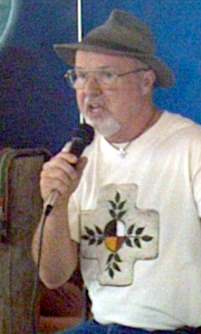 Myšlenka Richarda Rohra na čtvrtek po Popeleční středě - Převzít zodpovědnost Nefungující rodina žije z odmítání. Bývá tam nikde nekončící potřeba kontrolovat všechno a všechny. Děti v těchto rodinách vyrůstají v jakémsi chaotickém emočním životě pocházejícím odkudkoli a odnikud, přicházejícím odkudsi zpoza věcí. Nevědí, kde se to bere, ale vyrůstají vprostřed toho. Aby to překonali, pokoušejí se lidé řídit svůj svět, druhé lidi i …
Myšlenka Richarda Rohra na čtvrtek po Popeleční středě - Převzít zodpovědnost Nefungující rodina žije z odmítání. Bývá tam nikde nekončící potřeba kontrolovat všechno a všechny. Děti v těchto rodinách vyrůstají v jakémsi chaotickém emočním životě pocházejícím odkudkoli a odnikud, přicházejícím odkudsi zpoza věcí. Nevědí, kde se to bere, ale vyrůstají vprostřed toho. Aby to překonali, pokoušejí se lidé řídit svůj svět, druhé lidi i …
